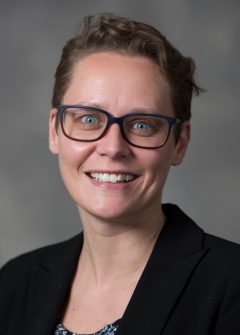Assistant Professor Katherine Reynolds joined the December 11 episode of "Tested," a podcast describing itself as a look at the challenges of “who we are, what we believe, and who we want to be in North Carolina and the South.”

A podcast produced by a North Carolina NPR affiliate recently featured the director of Elon Law’s Humanitarian Immigration Law Clinic, who spoke about refugees fearing that the Trump Administration wants to rescind green cards or deport them despite their legal status.
Assistant Professor Katherine Reynolds spoke with “Tested” podcast host Leoneda Inge for the December 11 episode “Who Gets to Be an American?”
Inge had already been reporting for WUNC 91.5 FM, an NPR affiliate in Chapel Hill, about recent changes to the federal government’s naturalization exam and how it affects who has access to citizenship.
Reynolds explained during the podcast that earlier changes to provisions in federal programs indicated to refugees that the government may not want green card holders to apply for full citizenship.
“That was the takeaway I was getting from people that I spoke with that had the eligibility to become citizens,” Reynolds said. “They were really concerned that there was something the government was going to find, and instead of granting them citizenship, which they were eligible for, would somehow find a way to rescind their green card or deport them.”
Later in the episode, Reynolds described hosting a socially distanced dance party in the parking lot of a federal office for a clinic client who earned his citizenship over the summer. The COVID-19 pandemic has impacted how newly naturalized citizens have been able to celebrate their accomplishment.
Before joining the Elon Law faculty, Reynolds was the Immigration Legal Services Program Coordinator at a refugee resettlement agency in Greensboro where she assisted refugees with adjustment of status and helped more than 150 lawful permanent residents to naturalize through a USCIS Citizenship and Integration Grant.
She was a supervising attorney at a refugee legal aid agency in Cairo, Egypt for three years, serving as director in her final year and managing an international staff of interpreters, attorneys, and volunteer legal advocates who provided assistance in obtaining UNHCR protection, refugee status, and resettlement for refugees and asylum-seekers from Sudan, Somalia, Ethiopia, Eritrea, Iraq, and Syria.


